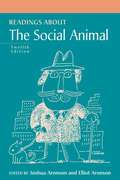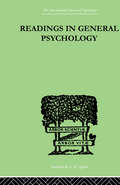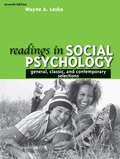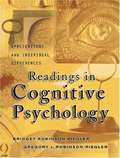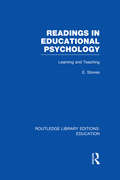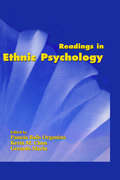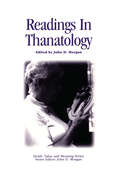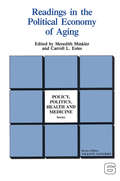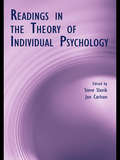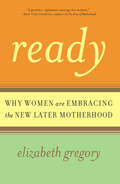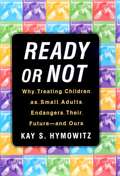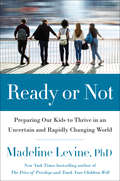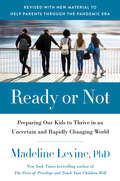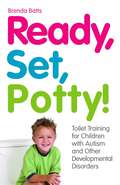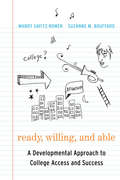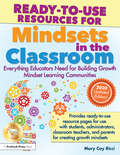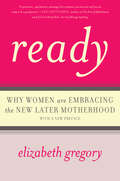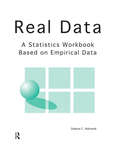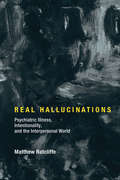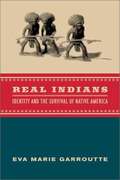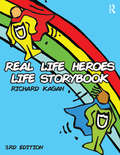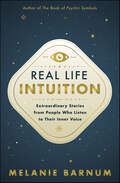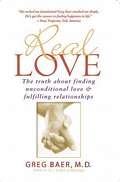- Table View
- List View
Readings About the Social Animal
by Elliot Aronson Joshua AronsonExploring the key ideas in social psychology, this collection of classic and contemporary readings includes accounts of specific experimental findings as well as more general articles summarizing studies on such topics as attraction, prejudice, and aggression. The new edition adds 15 new readings while retaining a number of classics by leading psychological thinkers such as Stanley Milgram on obedience and Solomon Asch on conformity. Readings makes the perfect companion for the Aronson's highly praised book, The Social Animal as it follows the same major themes. The Reader can also be used with any introductory social psychology text or even in lieu of a text. Using both The Social Animal textbook and the reader is a unique and engaging combination for understanding social psychology and its research.
Readings In General Psychology (International Library Of Psychology Ser.)
by Halmos, Paul & Iliffe, AlanThis is Volume XI of thirty-eight of collection of works on General Psychology. Initially published in 1959, with the aim of helping students of psychology, the intention in making this collection of papers is to provide a textbook which instead of the panoramic and superficial presentation of the whole field of psychology we have chosen to show a closer and more detailed view of a limited number of topics in an offering of twelve essays.
Readings In Social Psychology: General, Classic, And Contemporary Selections
by Wayne A. LeskoThis collection of readings gives students exposure to a wide variety of perspectives in the field of social psychology. Each of the fifteen chapters begins with an introduction and is followed by three articles: one general (popular), one classic, and one contemporary. The articles are followed by critical questions designed to facilitate comprehension and encourage discussion. The use of both popular readings and research articles provides students with a broad range of views and theories within the discipline of social psychology. The topical organization of the collection directly parallels Baron/Byrne/Branscombe's Social Psychology, Eleventh Edition. However, Readings in Social Psychology can be used with any social psychology textbook, or as a stand-alone reader in courses that do not use full textbooks.
Readings in Cognitive Psychology: Applications, Connections, and Individual Differences
by Greg L. Robinson-Riegler Bridget Robinson-RieglerThis reader offers articles that students can relate to several different facets of cognition, as well as other sub-disciplines of psychology. Topics such as the distinction between top-down and bottom-up processing, divided attention, proactive interference, language learnability, and expertise are presented in these up-to-date, highly informative, and interesting articles. This is a research reader students will find interesting, applicable, and extremely relevant to their course and lives. Students will get a good deal of exposure to the fundamental concepts that have helped define the field of cognitive psychology.
Readings in Educational Psychology: Learning And Teaching (Routledge Library Editions: Education)
by Edgar StonesThe papers in this volume relate to the nature and conditions of classroom learning, with particular emphasis on the cognitive aspects. They are concerned with the question of concept formation and stress the importance of the teacher’s function in ensuring that the child really has assimilated the ideas and not merely the words for the concepts. The role of language is fundamental to this theme, and the interaction of language, thinking and learning is dealt with in the first section of the book. This section also provides a context within which subsequent discussions of classroom learning problems can be viewed. Some problems concerning the elaboration of a general theory of teaching are then examined with particular reference to possible methods of bridging the gap between research and implementation.
Readings in Ethnic Psychology
by Pamela Balls Organista Kevin M. Chun Gerardo MarínFirst published in 1998. Routledge is an imprint of Taylor & Francis, an informa company.
Readings in Thanatology (Death, Value and Meaning Series)
by John D. MorganA comprehensive book of readings for courses on death and dying at the college or university level. It contains material by such leaders in the field as: Colin Murray Parkes, MD, John Hinton, MD, Kenneth Doka, PhD, Ira R Byock, MD, Ronald K Barrett, PhD, Robert G Stevenson, EdD, Judith M Stillion, PhD.
Readings in the Political Economy of Aging (Policy, Politics, Health and Medicine Series)
by Meredith Minkler Carroll L EstesIncludes 16 essays which address many issues from a different perspective suggested by the experience of aging in America. This study explores the political, social, and economic realities which have an impact on Americans as they grow older.
Readings in the Theory of Individual Psychology
by Steve SlavikReadings in the Theory of Individual Psychology presents an overview of the central theoretical tenets and specific fundamental concepts of Individual Psychology, framed on terms that make it possible to verify empirically many of these theoretical foundations. Sections of the book are organized into subject areas such as social interest, creative self, lifestyle, and family constellation, each containing seminal articles by Adler, Dreikurs, and other founding thinkers, and introduced with an original essay by a contemporary scholar. Readings in the Theory of Individual Psychology informs the reader of the recent and current theory in Individual Psychology, presented in order to generate new empirical research and future directions for development. Slavik and Carlson have pulled together a truly unique source for current thinking and theorizing in the field, providing the next generation of researchers, scholars, and scientists with the tools to move Individual Psychology into its next phase of refinement.
Readings on the Psychology of Place: Selected Works of David Canter (World Library of Psychologists)
by David CanterIn the World Library of Psychologists series, international experts present career-long collections of what they judge to be their most interesting publications – extracts from books, key articles, research findings and practical and theoretical contributions. In this fascinating volume, Professor David Canter refl ects on a career that has earned him an international reputation as one of the U.K.’s most eminent applied social psychologists and a pioneer in the fi eld of environmental psychology, through a selection of papers that illustrate one of the foundational themes of his research career: the psychology of place. Split into four parts, each with a new introduction written by the author, the book provides insights into theories, methods and applications of place psychology. Covering a range of publications from early research in the 1960s up to recent explorations, this volume provides the unfolding research that elaborates this seminal theory, offering rich perspectives on how places gain their significance and meaning. Featuring specially written commentary by the author contextualizing the selections and providing an intimate overview of his career, this collection of key publications offers a unique and compelling insight into decades of ground-breaking work, making it an essential resource for all those engaged or interested in the study of places.
Ready
by Elizabeth GregoryOver the past three decades, skyrocketing numbers of women have chosen to start their families in their late thirties and early forties. In 2005, ten times as many women had their first child between the ages of 35 and 39 as in 1975, and thirteen times as many had their first between 40 and 44. Women now have the option to define for themselves when they're ready for family, rather than sticking to a schedule set by social convention. As a society, however, we have yet to come to terms with the phenomenon of later motherhood, and women who decide it makes sense for them to delay pregnancy often find themselves confronted with alarmist warnings about the dangers of waiting too long.In Ready, Elizabeth Gregory tracks the burgeoning trend of new later motherhood and demonstrates that for many women today, waiting for family works best. She provides compelling evidence of the benefits of having children later--by birth or by adoption. Gregory reveals that large numbers of women succeed in having children between 35 and 44 by the usual means (one in seven kids born today has a mom in that age range), and that many of those who don't succeed nonetheless find alternate routes to happy families via egg donation or adoption. And they're glad they waited. Without ignoring the complexities that older women may face in their quest to have children, Gregory reveals the many advantages of waiting: Stronger family focus: Having achieved many of their personal and career goals, new later moms feel ready to focus on family rather than trying to juggle priorities More financial power: New later moms have established careers and make higher salaries Greater self-confidence: New later moms have more career experience, and their management skills translate directly into managing a household and advocating for their children More stable single-parenting: New later moms who are single have more resources High marriage rate: On average, 85 percent of new later moms are married, lending stability to the family structure Longer lives: Evidence indicates that new later moms actually live longer than moms who start their families earlier Based on in-depth interviews with more than 100 new later moms and extensive collateral research, Ready shatters the myths surrounding later motherhood. Drawing on both the statistical evidence and the voices of the new later mothers themselves, Gregory delivers surprising and welcome news that will revolutionize the way we think about motherhood.
Ready or Not
by Kay S. Hymowitz"Children today grow up so fast!" How often we hear those words, uttered both in frustrated good humor and in dumbfounded astonishment. Every day the American people hear about kids doing things, both good and bad, that were once thought to be well beyond their scope: flying airplanes, running companies, committing mass murder. Creatures of the information age, today's children sometimes seem to know more than their parents. They surf the Internet rather than read books, they watch South Park instead of The Cosby Show, they wear form-fitting capri pants and tank tops instead of sundresses; in short, they are sophisticated beyond their years. These facts lead us to wonder: Is childhood becoming extinct? In Ready or Not, Kay S. Hymowitz offers a startling new interpretation of what makes our children tick and where the moral anomie of today's children comes from. She reveals how our ideas about childrearing itself have been transformed, perniciously, in reponse to the theories of various "experts" -- educators, psychologists, lawyers, media executives -- who have encouraged us to view children as small adults, autonomous actors who know what is best for themselves and who have no need for adult instruction or supervision. Today's children and teenagers have been encouraged by their parents and teachers to function as individuals to such an extent that they make practically every decision on their own -- what to wear, what to study, and even what values they will adhere to. The idea of childhood as a time of limited competence, in which adults prepare the young for maturity, has fallen into disrepute; independence has become not the reward of time, but rather something that our children have come to expect and demand at increasingly younger ages. One of the great ironies of turning our children into small adults is that American society has become less successful at producing truly mature men and women. When sophisticated children do grow up, they often find themselves unable to accept real adult responsibilities. Thus we see more people in their twenties and thirties living like children, unwilling to embark on careers or to start families. Until we recognize that children are different from grownups and need to be nurtured as such, Hymowitz argues, our society will be hollow at its core.
Ready or Not: Preparing Our Kids to Thrive in an Uncertain and Rapidly Changing World
by Madeline Levine PhDThe New York Times bestselling author of The Price of Privilege and Teach Your Children Well explores how today’s parenting techniques and our myopic educational system are failing to prepare children for their certain-to-be-uncertain future—and how we can reverse course to ensure their lasting adaptability, resilience, health and happiness.In The Price of Privilege, respected clinician, Madeline Levine was the first to correctly identify the deficits created by parents giving kids of privilege too much of the wrong things and not enough of the right things. Continuing to address the mistaken notions about what children need to thrive in Teach Your Children Well, Levine tore down the myth that good grades, high test scores, and college acceptances should define the parenting endgame. In Ready or Not, she continues the discussion, showing how these same parenting practices, combined with a desperate need to shelter children from discomfort and anxiety, are setting future generations up to fail spectacularly.Increasingly, the world we know has become disturbing, unfamiliar, and even threatening. In the wake of uncertainty and rapid change, adults are doubling-down on the pressure-filled parenting style that pushes children to excel. Yet these daunting expectations, combined with the stress parents feel and unwittingly project onto their children, are leading to a generation of young people who are overwhelmed, exhausted, distressed—and unprepared for the future that awaits them. While these damaging effects are known, the world into which these children are coming of age is not. And continuing to focus primarily on grades and performance are leaving kids more ill-prepared than ever to navigate the challenges to come.But there is hope. Using the latest developments in neuroscience and epigenetics (the intersection of genetics and environment), as well as extensive research gleaned from captains of industry, entrepreneurs, military leaders, scientists, academics, and futurists, Levine identifies the skills that children need to succeed in a tumultuous future: adaptability, mental agility, curiosity, collaboration, tolerance for failure, resilience, and optimism. Most important, Levine offers day-to-day solutions parents can use to raise kids who are prepared, enthusiastic, and ready to face an unknown future with confidence and optimism.
Ready or Not: Preparing Our Kids to Thrive in an Uncertain and Rapidly Changing World
by Madeline Levine PhDThe New York Times bestselling author of The Price of Privilege and Teach Your Children Well explores how today’s parenting techniques and our myopic educational system are failing to prepare children for their certain-to-be-uncertain future—and how we can reverse course to ensure their lasting adaptability, resilience, health and happiness.In The Price of Privilege, respected clinician, Madeline Levine was the first to correctly identify the deficits created by parents giving kids of privilege too much of the wrong things and not enough of the right things. Continuing to address the mistaken notions about what children need to thrive in Teach Your Children Well, Levine tore down the myth that good grades, high test scores, and college acceptances should define the parenting endgame. In Ready or Not, she continues the discussion, showing how these same parenting practices, combined with a desperate need to shelter children from discomfort and anxiety, are setting future generations up to fail spectacularly.Increasingly, the world we know has become disturbing, unfamiliar, and even threatening. In the wake of uncertainty and rapid change, adults are doubling-down on the pressure-filled parenting style that pushes children to excel. Yet these daunting expectations, combined with the stress parents feel and unwittingly project onto their children, are leading to a generation of young people who are overwhelmed, exhausted, distressed—and unprepared for the future that awaits them. While these damaging effects are known, the world into which these children are coming of age is not. And continuing to focus primarily on grades and performance are leaving kids more ill-prepared than ever to navigate the challenges to come.But there is hope. Using the latest developments in neuroscience and epigenetics (the intersection of genetics and environment), as well as extensive research gleaned from captains of industry, entrepreneurs, military leaders, scientists, academics, and futurists, Levine identifies the skills that children need to succeed in a tumultuous future: adaptability, mental agility, curiosity, collaboration, tolerance for failure, resilience, and optimism. Most important, Levine offers day-to-day solutions parents can use to raise kids who are prepared, enthusiastic, and ready to face an unknown future with confidence and optimism.
Ready, Set, Potty!
by Brenda BattsPotty training a child with developmental disorders can be a real challenge, and sometimes the extra difficulties make you feel as though you've tried everything, and failed. In this book, Brenda Batts shows how you can overcome problems, big and small, and provides tried and tested methods that really work, tailored to each individual child. Bursting with ideas on how to see past conventional strategies and adapt toilet training to suit your child, this book outlines methods that have helped even the most despairing of parents and caregivers. Examples of success stories range from two-year-olds to adults aged 20, and show that no matter how difficult it may seem, a little creativity and adaptation can get anyone toilet trained, however many previous attempts have failed. The program itself is supported by plenty of helpful hints and tips, as Brenda covers all you need to get your child past the diaper stage and help them to achieve a big step towards independence. This book is a must for anybody looking to toilet train someone with developmental disorders.
Ready, Willing, and Able: A Developmental Approach to College Access and Success
by Mandy Savitz-Romer Suzanne BouffardHow can an understanding of adolescent development inform strategies and practices for supporting first-generation college goers? In Ready, Willing, and Able, Mandy Savitz-Romer and Suzanne Bouffard focus on the developmental tasks and competencies that young people need to develop in order to plan for and succeed in higher education. These include identity development, articulating aspirations and expectations, forming and maintaining strong peer and adult relationships, motivation and goal-setting, and self-regulatory skills, such as planning. The authors challenge the predominant approach of giving young people information and leaving it to them to figure out how to apply it. They show how well-intended college-access efforts can miss the mark--for instance, by focusing on students who already see themselves as college material, rather than working to help all students develop a "college-going identity." In addition, most college-access programs and practices focus almost exclusively on providing academic preparation and financial support. In Ready, Willing, and Able, Savitz-Romer and Bouffard call for a new approach: one that emphasizes the key developmental tasks and processes of adolescence and integrates them into existing college-access practices in meaningful ways. Rather than treating young people as passive recipients of services, they argue, adults can engage them as active agents in the construction of their own futures.
Ready, Willing, and Able: A Developmental Approach to College Access and Success
by Mandy Savitz-Romer Suzanne BouffardHow can an understanding of adolescent development inform strategies and practices for supporting first-generation college goers? In Ready, Willing, and Able, Mandy Savitz-Romer and Suzanne Bouffard focus on the developmental tasks and competencies that young people need to develop in order to plan for and succeed in higher education. These include identity development, articulating aspirations and expectations, forming and maintaining strong peer and adult relationships, motivation and goal-setting, and self-regulatory skills, such as planning. The authors challenge the predominant approach of giving young people information and leaving it to them to figure out how to apply it. They show how well-intended college-access efforts can miss the mark—for instance, by focusing on students who already see themselves as college material, rather than working to help all students develop a &“college-going identity.&” In addition, most college-access programs and practices focus almost exclusively on providing academic preparation and financial support. In Ready, Willing, and Able, Savitz-Romer and Bouffard call for a new approach: one that emphasizes the key developmental tasks and processes of adolescence and integrates them into existing college-access practices in meaningful ways. Rather than treating young people as passive recipients of services, they argue, adults can engage them as active agents in the construction of their own futures.
Ready-to-Use Resources for Mindsets in the Classroom: Everything Educators Need for Building Growth Mindset Learning Communities
by Mary Cay RicciReady-to-Use Resources for Mindsets in the Classroom provides educators with tools they need to help students change their thinking about their abilities and potential. The book features ready-to-use, interactive tools for students, teachers, parents, administrators, and professional development educators. When students believe that dedication and hard work can change their performance in school, they grow to become resilient, successful students.
Ready: Why Women Are Embracing the New Later Motherhood
by Elizabeth GregoryOver the past three decades, skyrocketing numbers of women have chosen to start their families in their late thirties and early forties. In 2005, ten times as many women had their first child between the ages of 35 and 39 as in 1975, and thirteen times as many had their first between 40 and 44. Women now have the option to define for themselves when they're ready for family, rather than sticking to a schedule set by social convention. As a society, however, we have yet to come to terms with the phenomenon of later motherhood, and women who decide it makes sense for them to delay pregnancy often find themselves confronted with alarmist warnings about the dangers of waiting too long.In Ready, Elizabeth Gregory tracks the burgeoning trend of new later motherhood and demonstrates that for many women today, waiting for family works best. She provides compelling evidence of the benefits of having children later--by birth or by adoption. Gregory reveals that large numbers of women succeed in having children between 35 and 44 by the usual means (one in seven kids born today has a mom in that age range), and that many of those who don't succeed nonetheless find alternate routes to happy families via egg donation or adoption. And they're glad they waited. Without ignoring the complexities that older women may face in their quest to have children, Gregory reveals the many advantages of waiting: Stronger family focus: Having achieved many of their personal and career goals, new later moms feel ready to focus on family rather than trying to juggle priorities More financial power: New later moms have established careers and make higher salaries Greater self-confidence: New later moms have more career experience, and their management skills translate directly into managing a household and advocating for their children More stable single-parenting: New later moms who are single have more resources High marriage rate: On average, 85 percent of new later moms are married, lending stability to the family structure Longer lives: Evidence indicates that new later moms actually live longer than moms who start their families earlier Based on in-depth interviews with more than 100 new later moms and extensive collateral research, Ready shatters the myths surrounding later motherhood. Drawing on both the statistical evidence and the voices of the new later mothers themselves, Gregory delivers surprising and welcome news that will revolutionize the way we think about motherhood.
Real Data: A Statistics Workbook Based on Empirical Data
by Zealure C Holcomb• In Real Data, students predict the answers to interesting questions. Then they analyze data supplied by leading researchers to see if there is empirical support for their predictions. • Students get practice in computing all the major statistics usually covered in an introductory statistics course. • Because each of the 35 exercises in Part A deals with only a limited number of statistics, the workbook is easily coordinated with all introductory statistics textbooks. • Part A emphasizes small data sets that are useful whether students are using calculators or computers. The exercises in this part are highly structured so students know exactly what is required of them. • Part B provides larger data sets for comprehensive analysis by computer users. Loosely structured, the data sets allow you to specify which statistics should be computed. • Sample topics: Kissing and Sexual Harassment; Basic Trust of Rape Survivors; Gambling and Stealing; Pregnancy Risk Among Adolescents Who Had Been Sexually Abused; Boys Interacting with Their Fathers; Racial Differences in Seeking Medical Assistance; Instructors’ Clothing and Student Evaluations; Students’ Attitudes Toward Math; and Physician-Assisted Suicide. • Using real data for analysis makes the traditional statistics class come alive.
Real Hallucinations: Psychiatric Illness, Intentionality, and the Interpersonal World (Philosophical Psychopathology)
by Matthew RatcliffeA philosophical account of the structure of experience and how it depends on interpersonal relations, developed through a study of auditory verbal hallucinations and thought insertion.In Real Hallucinations, Matthew Ratcliffe offers a philosophical examination of the structure of human experience, its vulnerability to disruption, and how it is shaped by relations with other people. He focuses on the seemingly simple question of how we manage to distinguish among our experiences of perceiving, remembering, imagining, and thinking. To answer this question, he first develops a detailed analysis of auditory verbal hallucinations (usually defined as hearing a voice in the absence of a speaker) and thought insertion (somehow experiencing one's own thoughts as someone else's). He shows how thought insertion and many of those experiences labeled as “hallucinations” consist of disturbances in a person's sense of being in one type of intentional state rather than another.Ratcliffe goes on to argue that such experiences occur against a backdrop of less pronounced but wider-ranging alterations in the structure of intentionality. In so doing, he considers forms of experience associated with trauma, schizophrenia, and profound grief.The overall position arrived at is that experience has an essentially temporal structure, involving patterns of anticipation and fulfillment that are specific to types of intentional states and serve to distinguish them phenomenologically. Disturbances of this structure can lead to various kinds of anomalous experience. Importantly, anticipation-fulfillment patterns are sustained, regulated, and disrupted by interpersonal experience and interaction. It follows that the integrity of human experience, including the most basic sense of self, is inseparable from how we relate to other people and to the social world as a whole.
Real Indians: Identity and the Survival of Native America
by Eva Marie GarroutteAn insightful and original analysis of the competing ways that Indian identity is defined, followed by a discussion of a new way of defining Indian-ness, which the author calls "indigenous theory."
Real Life Heroes Life Storybook: A Life Storybook For Children
by Richard KaganReal Life Heroes Life Storybook, 3rd Edition is a resourceful tool for children with traumatic stress. The resiliency-centered format and structure of the volume is coupled with treatment and sessions outlined in the Real Life Heroes Toolkit for Treating Traumatic Stress in Children and Families. This updated edition uses a creative arts approach, encouraging children to work with dependable adults to develop autobiographies through a wide range of activities, including drawings, music, movies, and narrative. By helping children feel protection from adversity and stressors that exist in everyday life, this workbook gives children a sense of value that can promote transformation of troubled children from victims into tomorrow's heroes.
Real Life Intuition: Extraordinary Stories from People Who Listen to Their Inner Voice
by Melanie BarnumTrust Your Metaphysical Senses and Master Your IntuitionFeaturing empowering and sometimes surprising experiences from real people and exercises for developing your natural gifts, this book teaches you how to use intuition to get ahead in life. Discover inspiring stories from doctors, lawyers, musicians, therapists, and other professionals who tapped into their intuition and experienced a positive life shift. Through these vignettes you will gain a deeper understanding and working knowledge of your five clairs: clairsentience, claircognizance, clairvoyance, clairaudience, and clairalience. Melanie Barnum also reveals how to interpret dreams, intuitive flashes, and signs and synchronicities. With this book, you will tune in to the universal energy that connects us all and use it to help move toward greater success and joy.
Real Love: The Truth about Finding Unconditional Love & Fulfilling Relationships
by Greg BaerWith Real Love, nothing else matters; without it, nothing else is enough. Why do most people spend their whole lives searching for loving and happy relationships but rarely find them? What is the "secret something" that all relationships need in order to thrive? Dr. Greg Baer found the answers to these questions while working with hundreds of individuals and couples. In Real Love, he shares his enlightening and practical blueprint for creating successful relationships and reveals the secret to finding and keeping what he calls "Real Love. " You'll discover: - The difference between Imitation Love, or conditional love, which most people grow up experiencing, and Real Love, the secret to genuine happiness- How to eliminate conflicts in relationships with spouses, children, parents, siblings, friends, and colleagues- How to put an end to destructive "Getting" and "Protecting" behaviors- Precisely how dishonesty, criticism, and blame-fixing can irrevocably damage relationships- How Real Love can break the cycles of expectation and disappointment and how it can ease and eradicate feelings of anger, resentment, and fear- The four steps to finding Real LoveWith Real Love as your guide, you can begin to heal the wounds of your past and create rewarding and fulfilling relationships in every area of your life.
